百度登录加密协议分析
百度登录加密协议分析(上) - 七夜的故事 - 博客园 https://www.cnblogs.com/qiyeboy/p/5722424.html
百度登录加密协议分析(下) - 七夜的故事 - 博客园 https://www.cnblogs.com/qiyeboy/p/5728293.html
好了,废话不多说,咱们进入今天的主题,讲解一下前段时间做的百度登录加密协议分析,由于写的比较详细,篇幅有点多,所以就分为上下两篇来写。由于百度登录使用的是同一套加密规则,所以这次就以百度云盘的登录为例进行分析。


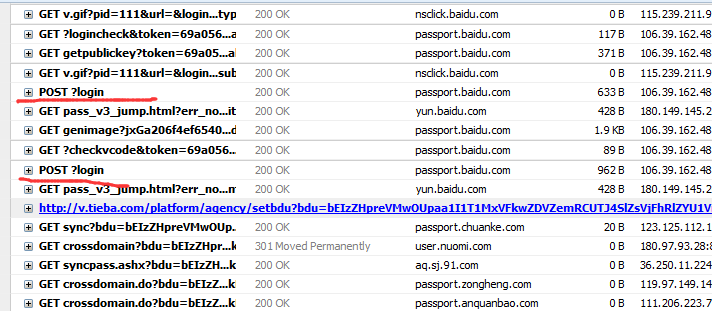
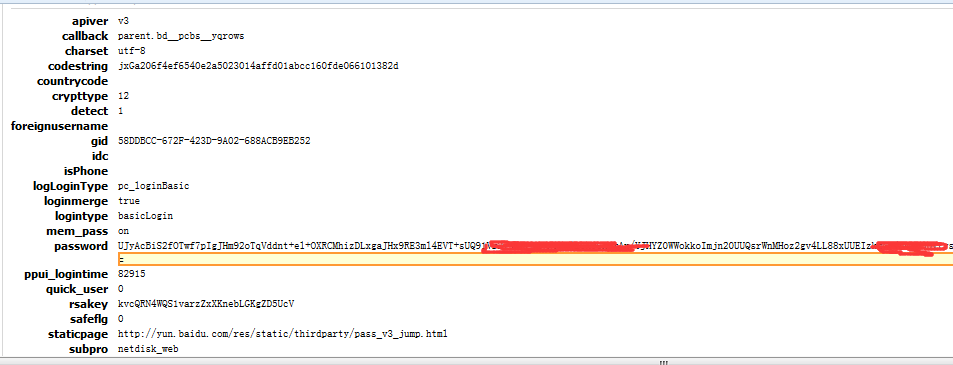
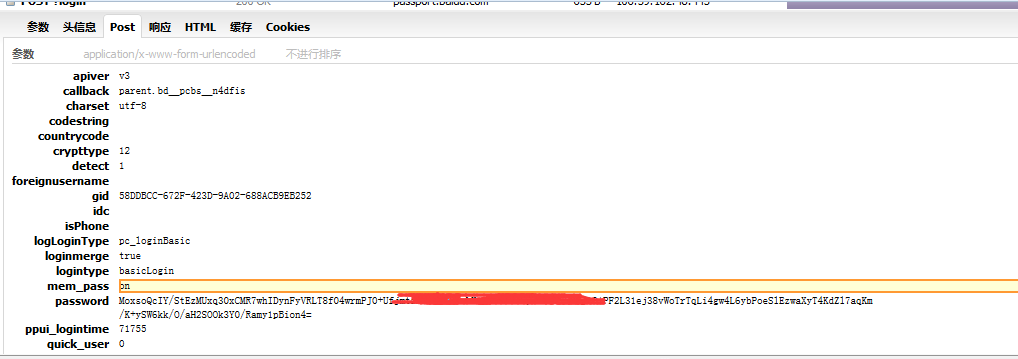





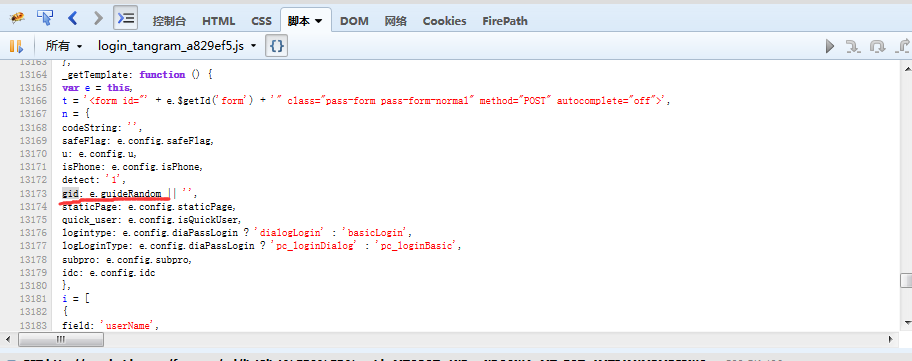
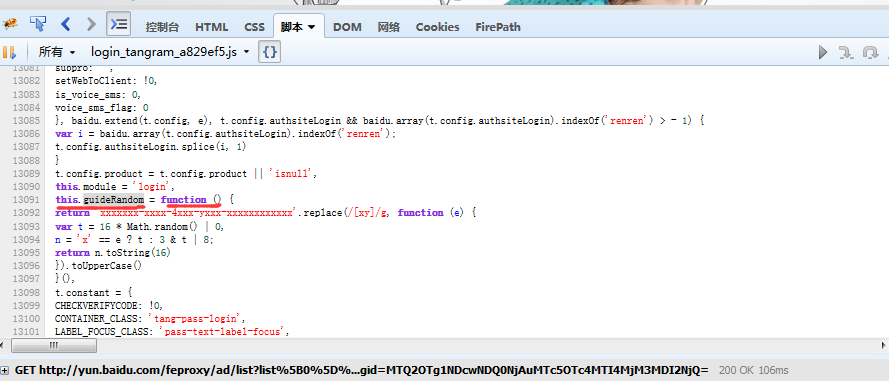
第三部分:
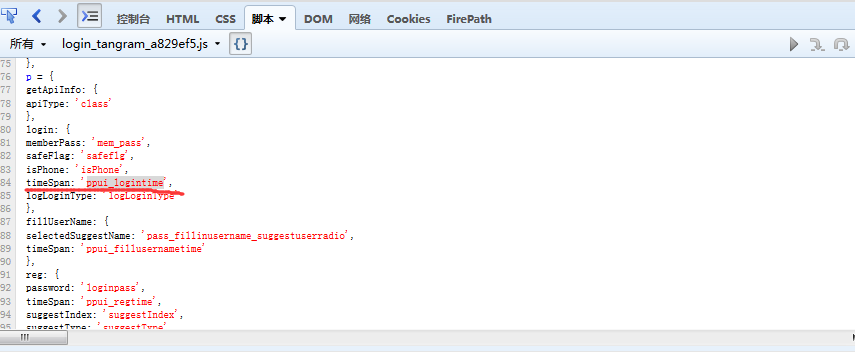
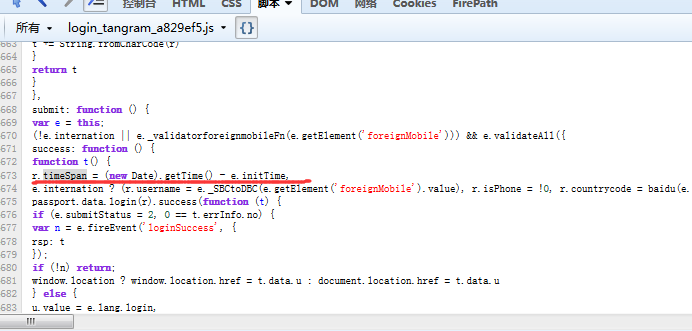
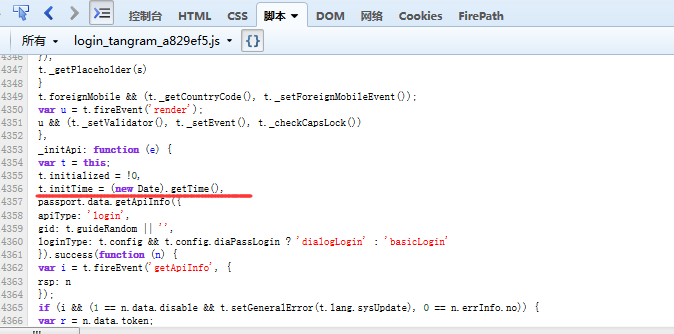
_eventHandler: function() {
var e,
t = {
focus: function(t) {
var n = e.fireEvent('fieldFocus', {
ele: this
});
n && (this.addClass(e.constant.FOCUS_CLASS), this.removeClass(e.constant.ERROR_CLASS), baidu(e.getElement(t + 'Label')).addClass(e.constant.LABEL_FOCUS_CLASS))
},
blur: function(t) {
var n = e.fireEvent('fieldBlur', {
ele: this
});
n && (this.removeClass(e.constant.FOCUS_CLASS), baidu(e.getElement(t + 'Label')).removeClass(e.constant.LABEL_FOCUS_CLASS))
},
mouseover: function() {
var t = e.fireEvent('fieldMouseover', {
ele: this
});
t && this.addClass(e.constant.HOVER_CLASS)
},
mouseout: function() {
var t = e.fireEvent('fieldMouseout', {
ele: this
});
t && this.removeClass(e.constant.HOVER_CLASS)
},
keyup: function() {
e.fireEvent('fieldKeyup', {
ele: this
})
}
},
n = {
focus: {
userName: function() {
e.config.loginMerge && e.getElement('loginMerge') && (e.getElement('loginMerge').value = 'true', e.getElement('isPhone').value = '')
},
password: function() {
e._getRSA(function(t) {
e.RSA = t.RSA,
e.rsakey = t.rsakey
})
},
verifyCode: function() {}
},
blur: {
userName: function() {},
password: function(t) {
var n = this.get(0).value;
n.length && e.validate(t)
},
verifyCode: function(t) {
var n = this.get(0).value;
n.length && e.validate(t)
}
},
change: {
userName: function() {
var t = this.get(0).value;
e._loginCheck(t)
},
verifyCode: function() {}
},
click: {
verifyCodeChange: function(t, n) {
e.getElement('verifyCode').value = '',
e._doFocus('verifyCode'),
e.getVerifyCode(),
n.preventDefault()
}
},
keyup: {
verifyCode: function() {
var t = e.getElement('verifyCode'),
n = baidu(t);
t.value && 4 == t.value.length ? e._asyncValidate.checkVerifycode.call(e, {
error: function(t) {
n.addClass(e.constant.ERROR_CLASS),
e.setGeneralError(t.msg)
},
success: function() {
n.removeClass(e.constant.ERROR_CLASS),
e.clearGeneralError()
}
}) : e.$hide('verifyCodeSuccess')
}
},
submit: function(t) {
e.submit(),
t.preventDefault()
}
};
return {
entrance: function(i) {
e = this;
var r = (baidu(i.target), i.target.name);
if (!r && i.target.id) {
var o = i.target.id.match(/\d+__(.*)$/);
o && (r = o[1])
}
r && (t.hasOwnProperty(i.type) && t[i.type].apply(baidu(i.target), [
r,
i
]), n.hasOwnProperty(i.type) && ('function' == typeof n[i.type] && n[i.type].apply(baidu(i.target), [
i
]), n[i.type].hasOwnProperty(r) && n[i.type][r].apply(baidu(i.target), [
r,
i
])), e.initialized || 'focus' != i.type || e._initApi())
}
}
}(),
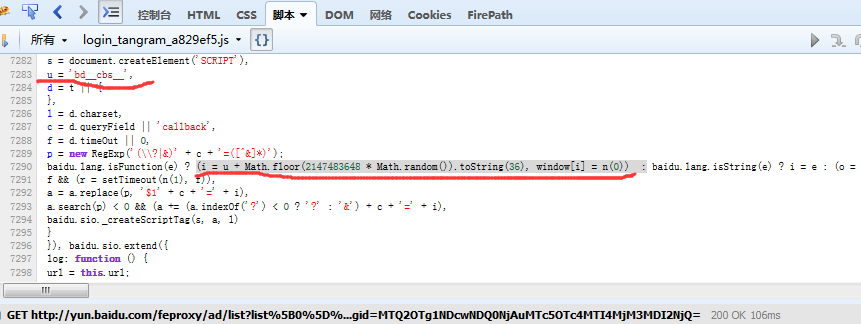
callback ='bd__cbs__'+Math.floor(2147483648 *Math.random()).toString(36)
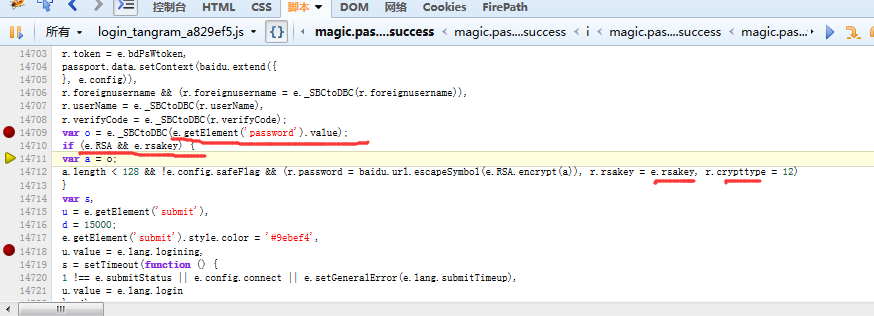
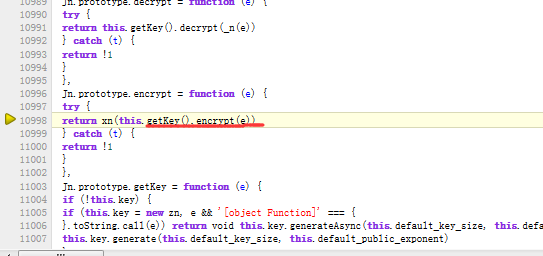
采用的是RSA加密方式:
from Crypto.PublicKey import RSA
from Crypto.Cipher import PKCS1_v1_5
password = 'xxxxxxxx'
with open('pub.pem') as f:
pubkey = f.read()
rsakey = RSA.importKey(pubkey)
cipher = PKCS1_v1_5.new(rsakey)
cipher_text = base64.b64encode(cipher.encrypt(password))
print cipher_text
3.5 由于之前安装了pyv8,所以不把gid,callback等js函数翻译成python了,翻译过来也很简单,如果你电脑上没装pyv8,就试着翻译一下。
function callback(){
return 'bd__cbs__'+Math.floor(2147483648 * Math.random()).toString(36)
}
function gid(){
return 'xxxxxxx-xxxx-4xxx-yxxx-xxxxxxxxxxxx'.replace(/[xy]/g, function (e) {
var t = 16 * Math.random() | 0,
n = 'x' == e ? t : 3 & t | 8;
return n.toString(16)
}).toUpperCase()
}
3.6 似乎还有验证码没说,其实就是两个链接,一个是获取验证码的链接,一个是检测验证码是否正确的链接。验证码获取很简单,这里就不详细说了。下面我会把整个登录的源代码,贴在下面有兴趣的,可以去玩一下。
总结:
下面我用python模拟了一下登录,使用了requests和pyv8(其实想偷懒),代码如下:
#coding:utf-8
import base64
import json
import re
from Crypto.Cipher import PKCS1_v1_5
from Crypto.PublicKey import RSA
import PyV8
from urllib import quote
import requests
import time
if __name__=='__main__':
s = requests.Session()
s.get('http://yun.baidu.com')
js='''
function callback(){
return 'bd__cbs__'+Math.floor(2147483648 * Math.random()).toString(36)
}
function gid(){
return 'xxxxxxx-xxxx-4xxx-yxxx-xxxxxxxxxxxx'.replace(/[xy]/g, function (e) {
var t = 16 * Math.random() | 0,
n = 'x' == e ? t : 3 & t | 8;
return n.toString(16)
}).toUpperCase()
}
'''
ctxt = PyV8.JSContext()
ctxt.enter()
ctxt.eval(js)
###########获取gid#############################3
gid = ctxt.locals.gid()
###########获取callback#############################3
callback1 = ctxt.locals.callback()
###########获取token#############################3
tokenUrl="https://passport.baidu.com/v2/api/?getapi&tpl=netdisk&subpro=netdisk_web&apiver=v3" \
"&tt=%d&class=login&gid=%s&logintype=basicLogin&callback=%s"%(time.time()*1000,gid,callback1)
token_response = s.get(tokenUrl)
pattern = re.compile(r'"token"\s*:\s*"(\w+)"')
match = pattern.search(token_response.text)
if match:
token = match.group(1)
else:
raise Exception
###########获取callback#############################3
callback2 = ctxt.locals.callback()
###########获取rsakey和pubkey#############################3
rsaUrl = "https://passport.baidu.com/v2/getpublickey?token=%s&" \
"tpl=netdisk&subpro=netdisk_web&apiver=v3&tt=%d&gid=%s&callback=%s"%(token,time.time()*1000,gid,callback2)
rsaResponse = s.get(rsaUrl)
pattern = re.compile("\"key\"\s*:\s*'(\w+)'")
match = pattern.search(rsaResponse.text)
if match:
key = match.group(1)
print key
else:
raise Exception
pattern = re.compile("\"pubkey\":'(.+?)'")
match = pattern.search(rsaResponse.text)
if match:
pubkey = match.group(1)
print pubkey
else:
raise Exception
################加密password########################3
password = 'xxxxxxx'#填上自己的密码
pubkey = pubkey.replace('\\n','\n').replace('\\','')
rsakey = RSA.importKey(pubkey)
cipher = PKCS1_v1_5.new(rsakey)
password = base64.b64encode(cipher.encrypt(password))
print password
###########获取callback#############################3
callback3 = ctxt.locals.callback()
data={
'apiver':'v3',
'charset':'utf-8',
'countrycode':'',
'crypttype':12,
'detect':1,
'foreignusername':'',
'idc':'',
'isPhone':'',
'logLoginType':'pc_loginBasic',
'loginmerge':True,
'logintype':'basicLogin',
'mem_pass':'on',
'quick_user':0,
'safeflg':0,
'staticpage':'http://yun.baidu.com/res/static/thirdparty/pass_v3_jump.html',
'subpro':'netdisk_web',
'tpl':'netdisk',
'u':'http://yun.baidu.com/',
'username':'xxxxxxxxx',#填上自己的用户名
'callback':'parent.'+callback3,
'gid':gid,'ppui_logintime':71755,
'rsakey':key,
'token':token,
'password':password,
'tt':'%d'%(time.time()*1000),
}
###########第一次post#############################3
post1_response = s.post('https://passport.baidu.com/v2/api/?login',data=data)
pattern = re.compile("codeString=(\w+)&")
match = pattern.search(post1_response.text)
if match:
###########获取codeString#############################3
codeString = match.group(1)
print codeString
else:
raise Exception
data['codestring']= codeString
#############获取验证码###################################
verifyFail = True
while verifyFail:
genimage_param = ''
if len(genimage_param)==0:
genimage_param = codeString
verifycodeUrl="https://passport.baidu.com/cgi-bin/genimage?%s"%genimage_param
verifycode = s.get(verifycodeUrl)
#############下载验证码###################################
with open('verifycode.png','wb') as codeWriter:
codeWriter.write(verifycode.content)
codeWriter.close()
#############输入验证码###################################
verifycode = raw_input("Enter your input verifycode: ");
callback4 = ctxt.locals.callback()
#############检验验证码###################################
checkVerifycodeUrl='https://passport.baidu.com/v2/?' \
'checkvcode&token=%s' \
'&tpl=netdisk&subpro=netdisk_web&apiver=v3&tt=%d' \
'&verifycode=%s&codestring=%s' \
'&callback=%s'%(token,time.time()*1000,quote(verifycode),codeString,callback4)
print checkVerifycodeUrl
state = s.get(checkVerifycodeUrl)
print state.text
if state.text.find(u'验证码错误')!=-1:
print '验证码输入错误...已经自动更换...'
callback5 = ctxt.locals.callback()
changeVerifyCodeUrl = "https://passport.baidu.com/v2/?reggetcodestr" \
"&token=%s" \
"&tpl=netdisk&subpro=netdisk_web&apiver=v3" \
"&tt=%d&fr=login&" \
"vcodetype=de94eTRcVz1GvhJFsiK5G+ni2k2Z78PYRxUaRJLEmxdJO5ftPhviQ3/JiT9vezbFtwCyqdkNWSP29oeOvYE0SYPocOGL+iTafSv8pw" \
"&callback=%s"%(token,time.time()*1000,callback5)
print changeVerifyCodeUrl
verifyString = s.get(changeVerifyCodeUrl)
pattern = re.compile('"verifyStr"\s*:\s*"(\w+)"')
match = pattern.search(verifyString.text)
if match:
###########获取verifyString#############################3
verifyString = match.group(1)
genimage_param = verifyString
print verifyString
else:
verifyFail = False
raise Exception
else:
verifyFail = False
data['verifycode']= verifycode
###########第二次post#############################3
data['ppui_logintime']=81755
####################################################
# 特地说明,大家会发现第二次的post出去的密码是改变的,为什么我这里没有变化呢?
#是因为RSA加密,加密密钥和密码原文即使不变,每次加密后的密码都是改变的,RSA有随机因子的关系
#所以我这里不需要在对密码原文进行第二次加密了,直接使用上次加密后的密码即可,是没有问题的。
# ###################################################################################
post2_response = s.post('https://passport.baidu.com/v2/api/?login',data=data)
if post2_response.text.find('err_no=0')!=-1:
print '登录成功'
else:
print '登录失败'
我把整个代码上传到git上了:https://github.com/qiyeboy/baidulogin.git,大家可以star和fork。



